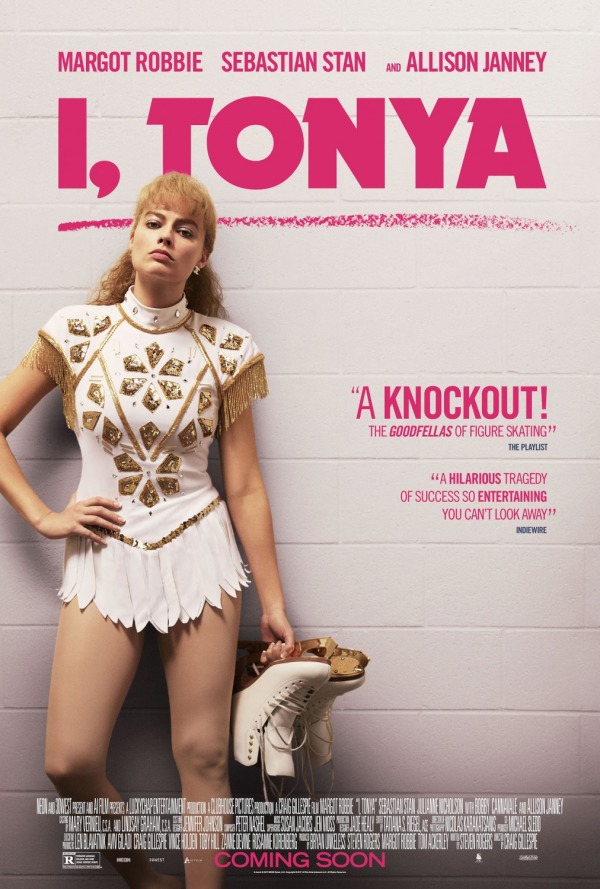I, TONYA (Directed by Craig Gillespie, 119 minutes, USA, 2017)
![]() BY DAN TABOR FILM CRITIC Much buzzed-about this Oscar season, I, Tonya is an unlikely prestige film about an unlikely Olympian starring Margot Robbie as the notorious Tonya Harding, the disgraced figure skater who conspired to have her rival maimed by her bodyguard right before the 1994 Olympics. This black comedy is constructed like a mockumentary, in the vein of The Big Short, where on-camera interviews with actors in character (“based on irony-free, wildly contradictory, totally true interviews” with the actual people portrayed in the film) are supplemented by reenactments that often break the fourth wall.
BY DAN TABOR FILM CRITIC Much buzzed-about this Oscar season, I, Tonya is an unlikely prestige film about an unlikely Olympian starring Margot Robbie as the notorious Tonya Harding, the disgraced figure skater who conspired to have her rival maimed by her bodyguard right before the 1994 Olympics. This black comedy is constructed like a mockumentary, in the vein of The Big Short, where on-camera interviews with actors in character (“based on irony-free, wildly contradictory, totally true interviews” with the actual people portrayed in the film) are supplemented by reenactments that often break the fourth wall.
The film begins with Harding already a skating prodigy at four years old. We witness Harding’s overbearing mother (Allison Janney) bringing her to meet to the coach that would one day take her to Lillehammer before she’s even learned how to talk. From there the film’s trajectory is pretty straightforward, after a few time jumps with various child actors playing pre-teen Harding, Robbie hilariously takes over as the quintessential Bad Girl teenage Harding, replete with big 80’s hair, bad attitude and braces.
Margot Robbie delivers a raw, disarmingly empathetic character study of the widely-despised Harding, who was born into poverty and rose to stardom only to be taken down by those who loved her — namely her her violent and abusive mother and her equally violent and abusive husband Jeff Gilooly, played with hapless white trash aplomb by Sebastian Stan. As Harding rises from trailer park nobody to an Olympic medalist who will become the first woman to land a triple axel, the disturbing cycle of abuse becomes readily apparent. While we all knew Robbie was capable of such a performance in the right hands, it’s Janney’s transformative take on Tonya’s overbearing and sadistic mother LaVona Fay Golden, that hijacks this film every time she’s on screen. Like Robbie’s take on Harding, it’s nothing short of a career defining performance.
To add some light and coal-black humor to an otherwise very dark story, director Craig Gillespie uses the tragicomic absurdity of the bungled attack on Nancy Kerrigan to great effect. According to both Harding and Gillooly in the film, the attack was originally just supposed to be a series of threatening letters, to throw the skater off her game. In their telling, it was Shawn Eckhardt (Paul Walter Hauser), Harding’s mouth-breathing, basement-dwelling “bodyguard,” who went rogue and escalated the plot into a violent physical attack on Kerrigan.
All of this unfolds concurrently with the rise of the voracious 24 hour cable news cycle — and the public’s increasingly insatiable hunger for celebrity, scandal and sensationalism — that devoured Tonya Harding almost as quickly as it made her a household name.
I, Tonya’s biggest surprise is not how great this film is, but how it doesn’t look to rescue Harding — who was eventually banned from competitive figure skating for life — while providing the heartbreaking backstory behind the outrageous tabloid headlines. I, Tonya was easily my favorite film of the year, with its indelible performances, note-perfect soundtrack (featuring aptly-named artists like Violent Femmes, Supertramp and Dire Straits) and rogue’s gallery of characters — a veritable confederacy of yutzes — who blundered their way into history and unwittingly paved the way for America’s next tawdry celebrity obsession, the OJ Simpson trial.

